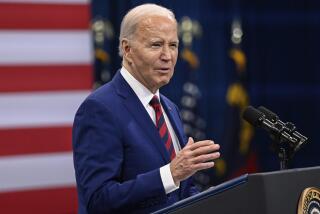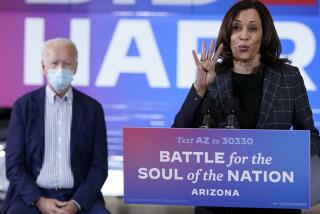Winning the West, Montana style
The Rocky Mountain West, which helped give Democrats the White House and control of the U.S. Senate, has emerged as a key 2012 battleground as President Obama works to win back independents and others disaffected by the last two years of high unemployment, soaring deficits and expansive government growth.
Obama achieved a breakthrough in 2008, carrying Nevada, Colorado and New Mexico and coming close to winning Montana, a state Democrats lost overwhelmingly in the two previous presidential campaigns.
Since then, he has worked to solidify his support, appointing Westerners to important positions such as Interior secretary, and avoiding issues such as gun control and mining reform that had hurt previous Democrats. Even so, Obama’s approval ratings have fallen across the region.
That has not only complicated the president’s reelection effort, but threatens fellow Democrats like Montana Sen. Jon Tester, who will likely share the ballot in 2012 and face one of the toughest reelection fights in the country. It was Tester’s narrow 2006 victory that helped Democrats seize control of the Senate.
His Republican opponent, Rep. Denny Rehberg, is now more likely to utter Obama’s name — and not in a good way — than the Democratic senator, which suggests how much the ground has shifted since the last presidential race. Asked whether he would stand alongside Obama if he campaigned in Montana, as he did in 2008, Tester suggested not.
“I’ll stand with [Brian] Schweitzer. I’ll stand with Max [Baucus],” Tester said of the state’s Democratic governor and senior U.S. senator. He had just finished a day of events that included visits to two union halls, a radio call-in show, a business round table at the Chamber of Commerce and a speech to a joint session of the Legislature.
“I’ll stand with people that I addressed today, on either side of the aisle, if they want to stand with me,” Tester said. “That’s who I look to.”
For years, the Rocky Mountain West was Republican territory. But over the last decade, it has become perhaps the most politically competitive region in the country.
All of the states the president won will likely be in play again next year, even as Democrats hope to expand the competition to Arizona, which Obama ceded to home-state Sen. John McCain in 2008. There could also be hard-fought U.S. Senate races in Nevada, New Mexico and Arizona as well as Montana.
Voters in the interior West have a deep and abiding hostility toward Washington (although they welcome the abundant federal dollars that flow their way). They directed that animosity toward Republicans in 2006 and 2008 after turning on President George W. Bush, in large part because of the war in Iraq.
“It’s not like the West suddenly became Democratic,” said Floyd Ciruli, a political pollster in Denver. “They were willing to give Obama a chance.”
But, he said, “Once Obama looked like he was part of a liberal Washington establishment, advocating lots of programs and lots of spending, he immediately lost Republicans and he mostly lost unaffiliated voters.”
The president’s moves since the midterm election — compromising with Republicans on tax cuts, promising to roll back regulations, focusing more on deficit reduction — have probably boosted his standing with the centrist voters he needs to win back, Ciruli and other analysts said.
Tester, like many Western Democrats, has a strategy that is both simpler and more complex: distancing himself — physically and culturally — as much as possible from Washington.
He is certainly no one’s idea of a slick politician. His suits look slept-in. His belly tumbles over his belt. His flat-top buzz cut was fashionable — if ever — back in the 1950s.
But Tester’s unvarnished appearance reflects Montana’s political culture; the worst thing a politician can do here is take on airs, which explains why no one blinked when the senator whipped off his red paisley tie in front of business leaders at the Chamber of Commerce and stuffed it in his jacket pocket (he was through with the day’s TV appearances).
“We still believe we’re small enough and neighborly enough we want to see and touch and feel our representatives,” said David Parker, who teaches politics at Montana State University. “If they’re perceived as strangers, they get in trouble.”
That is why Tester and Rehberg, a six-term incumbent and the only Republican in statewide office, both emphasize their accessibility. The senator returned home all but four weekends last year, making an eight- to 10-hour journey from Washington to his farm in Big Sandy. Rehberg held 75 “listening sessions” with voters, at least one in each of the state’s 56 counties.
That also explains why each side claims the other candidate is different from what he seems — and more like an outsider. “He’s got a conservative haircut,” Erik Iverson, a Rehberg strategist, said of Tester. “But he’s a liberal.”
Announcing his candidacy, Rehberg called Tester a “yes man for Barack Obama,” saying he sides with the administration on 97% of votes. He singled out Tester’s support for the healthcare bill and 2009 economic stimulus, both of which Rehberg opposed. “It’s contrary to what Montanans want,” said Rehberg, who helped lead House efforts to cut off funding for the healthcare bill.
Tester defends both. The healthcare legislation was a start toward repairing an out-of-control system, he told radio listeners, and contains “a lot of good stuff.” Any problems, he said, can be fixed.
The stimulus bill, he told state lawmakers, “pulled our nation away from the ledge of a catastrophic depression…. The only thing failed about it … was a vote against it.”
While supporting Obama on perhaps the two most important initiatives of his administration, Tester diverges from many in his party with his staunch support of gun rights and uncompromising stance on illegal immigration, an independence that plays well at home, if not on the far left. “I represent Montana,” he said, dismissing critics.
If “liberal” is an epithet in Montana and much of the West, so too is “extreme.” Independents nearly equal Democrats and Republicans in much of the region, and they tend to shun ideologues. That is one reason for November’s Senate results in Nevada and Colorado, where Democrats defeated “tea party” loyalists Sharron Angle and Ken Buck.
In Montana, Democrats already have seized on two of Rehberg’s recent statements to portray him as being outside the mainstream. They cited his jocular salute — “President Bachmann, where are you?” — when Rep. Michele Bachmann of Minnesota, a tea party favorite, appeared at a GOP dinner in Helena. And they jumped on his suggestion that a federal judge belongs on the endangered species list for upholding Washington management of the state’s gray wolf population; they said the comment was especially insensitive after the killing of a judge in the Tucson shootings.
The Rehberg camp brushed aside the criticism. But strategists said there was a danger for any candidate — whether seeking the White House or running for the Senate — who strays too far from the center.
Westerners “don’t want anyone to the extreme left. They don’t want anyone too far right,” said Katy Atkinson, a GOP strategist in Denver. “They want someone whose first loyalty is to principle, as opposed to party.”
More to Read
Start your day right
Sign up for Essential California for news, features and recommendations from the L.A. Times and beyond in your inbox six days a week.
You may occasionally receive promotional content from the Los Angeles Times.







